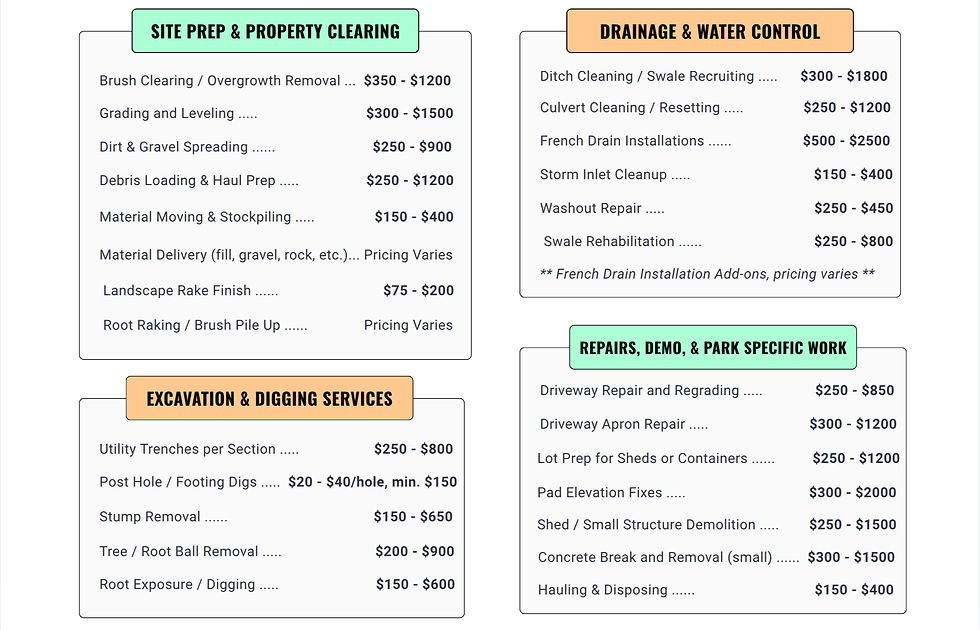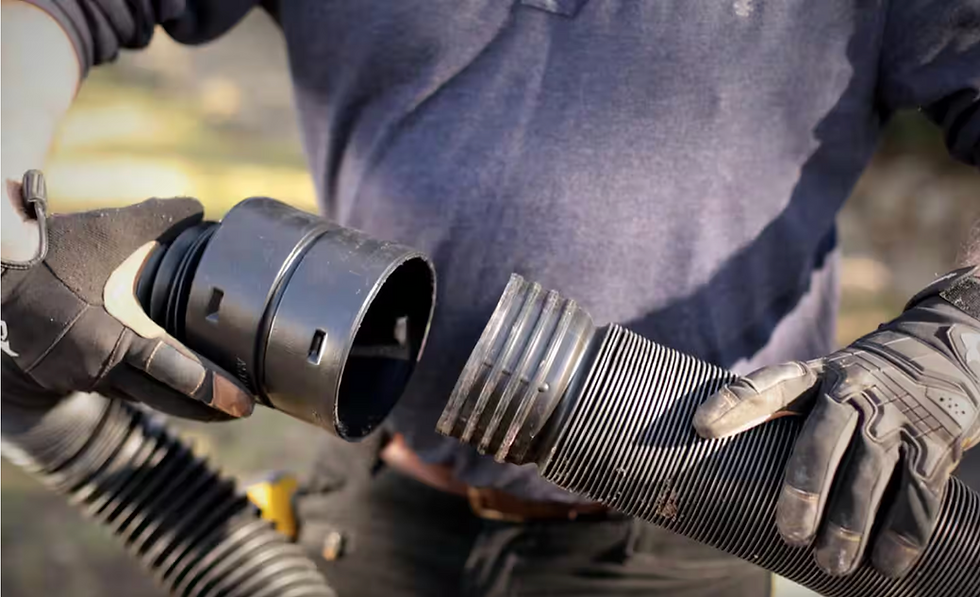NOT ALL PROBLEMS ARE ALWAYS VISIBLE.
GET A FREE SYSTEM CHECK!

CCTV Inspection
Everything went exactly the way they said it would, especially the job well done. No more flooded yard and it still looks great! Not to mention, fantastic people. Absolutely recommend them!
Sharon D., homeowner

A universal color-coding system is used to mark different types of underground utilities. For example, blue usually indicates potable water, green marks sewer lines, red is for electric, and yellow is for gas.

A universal color-coding system is used to mark different types of underground utilities. For example, blue usually indicates potable water, purple is non-potable, green marks sewer lines, red is for electric, and yellow is for gas.
What's Going on Down Under?
Most piping issues start underground, long before you ever notice a thing. By the time you see brown water, low pressure, or backyard flooding, the damage is already done. Many homes are still using outdated valves and materials prone to failure, but even newer properties still aren't immune.
Construction shortcuts, aging materials, storm damage, shifting ground, and decades of hidden wear can all lead to costly failures.
Everything went exactly the way they said it would, especially the job well done. No more flooded yard and it still looks great! Fantastic people, absolutely recommend them!
Sharon D., homeowner

A universal color-coding system is used to mark different types of underground utilities. For example, blue indicates potable water, purple is non-potable water, green marks sewer lines, red is for electric, and yellow is for gas.
Emergency Costs
It's never just ONE thing when your pipe fails... You may need excavation, temporary water shutoff, rush repairs, permits, driveway or landscaping restoration, and sometimes even hotel stays depending on the damage. What would’ve been a planned upgrade suddenly becomes a multi-thousand-dollar scramble. When you work with Underground Advantage, we minimize every piece of disruption we can to make sure your lives stay as normal as possible, all while pushing forward.
Water Quality and Rust
Even small amounts of rust or mineral buildup can affect taste, clarity, and safety. Some homeowners don't even realize it until guests mention the water seems "off." Minimal amounts won't necessarily kill you, but consumption over a long period of time is where the damage happens.
Iron Overload is a condition where the body stores too much iron over time and can damage organs like the heart, liver, and pancreas. Some of those symptoms can include:
-
Irregular heartbeat
-
Fatigue and weakness
-
Joint and abdominal pain
-
Liver issues, including cirrhosis
-
Diabetes
Rust in water is indicating contamination from corroded pipes. In older homes especially, corroded pipes can also release LEAD into your water, affecting you and your loved ones. (Including pets!) There is NO safe level of lead in water.
And on top of all of THAT, rusty pipes are a perfect place for bacteria to grow and multiply, an ideal breeding ground actually. When you don't take care of an everyday essential ( in all areas of life too ), becoming considerably ill mentally, physically, and emotionally is entirely a matter of when, not if.
So the question poses, what now?
Structural Damage
When underground pipes crack, corrode, or shift, the soil around the pipes begins to change. Water starts seeping into areas it shouldn’t, softening soil under foundations, loosening patios, or creating low spots in your yard. Over time, this can destabilize concrete, brickwork, or even the home’s foundation. By the time these signs show up at the surface, much bigger issues are already brewing underneath.

Structural Damage
When underground pipes crack, corrode, or shift, the soil around the pipes begins to change. Water starts seeping into areas it shouldn’t, softening soil under foundations, loosening patios, or creating low spots in your yard. Over time, this can destabilize concrete, brickwork, or even the home’s foundation. By the time these signs show up at the surface, much bigger issues are already brewing underneath.
Risks & Effects
Water Quality and Rust
Even small amounts of rust or mineral buildup can affect taste, clarity, and safety. Minimal amounts won't necessarily kill you, but consumption over a long period of time is where the damage happens.
Iron Overload is a condition where the body stores too much iron over time and can damage organs like the heart, liver, and pancreas. Some of those symptoms can include:
-
Irregular heartbeat
-
Fatigue and weakness
-
Joint and abdominal pain
-
Liver issues, including cirrhosis
-
Diabetes
Rust in water is also indicating contamination from corroded pipes. In older homes especially, corroded pipes can also release LEAD into your water, affecting you and your loved ones. (Including pets!) There is NO safe level of lead in your system.
And on top of all of that, rusty pipes are a perfect place for bacteria to grow and multiply, an ideal breeding ground actually.
So the question poses, what now?


Original Pipes from a Palmetto resident's home
Emergency Costs
It's never just ONE thing when your pipe fails... You may need excavation, temporary water shutoff, rush repairs, permits, driveway or landscaping restoration, and sometimes even hotel stays depending on the damage. What would’ve been a planned prevention suddenly becomes a multi-thousand-dollar scramble.


Once we've set up a time, we start with a free underground inspection using a high-definition camera to get a complete understanding of what's going on and determine what your next best move is.
Free Inspection
The issue isn’t always cracked or broken pipes. Buildup, blockages, or debris can also be the leading factor of stress in your system. We use high-pressure jetting and Vac-Con services to clear lines and restore flow without major disruption.
Cleaning & Clearing
When underground systems are too far gone, a patch job won't cut it. We handle full replacements with methods like Open-Trench or Pipe Bursting, to make sure it's all up to code and fully functioning. Curious how bursting works? Explore the process here.
Infrastructure Rebuild
By
Step
Step
Once we've set up a time, we start with a free underground inspection using a high-definition camera to get a complete understanding of what's going on and determine what your next best move is.
Free Inspection
Step By Step
The issue isn’t always cracked or broken pipes. Buildup, blockages, or debris can also be the leading factor of stress in your system. We use high-pressure jetting and Vac-Con services to clear lines and restore flow without major disruption.
Cleaning & Clearing
Now, when underground systems are too far gone, a patch job won't cut it. We handle full replacements with methods like Open-Trench or Pipe Bursting, to make sure it's all up to code and fully functioning. Curious how bursting works? Explore the process here.
Infrastructure Rebuild
Our services and Features

Our services and Features



French Drain Pipe Installation
In simplest terms, a French Drain helps stop water from pooling or flooding in your yard. It's a gravel-filled trench with a perforated pipe that collects and redirects excess water away from the problem. The pipe is slightly sloped so gravity does all the work, guiding the water toward a safe drainage point, like a storm drain.
Site Evaluation
Before digging, the area is assessed to identify where water is collecting and where it needs to go. This helps us determine the best path and slope for proper drainage.

Trench Preparation
A proper trench is dug along the planned route to handle the flow of water, while the base is leveled and cleared of debris to ensure the system drains efficiently. Once you've completed that, you begin to hook up the piping.


Lining and Pipe Placement
The trench is then lined with a filter fabric to keep out sediment, then a layer of gravel is added. The perforated pipe is placed on top, positioned at a slight slope so gravity can move the water naturally.


Trench Preparation
A proper trench is dug along the planned route to handle the flow of water, while the base is leveled and cleared of debris to ensure the system drains efficiently. Once you've completed that, you begin to hook up the piping.
Of course, there's a lot more that goes into it - precise measurements, the right materials, and specific equipment all make the difference in how well the system performs.
Covering and Backfill
Once the pipe is in place, more gravel is poured over it for stability and filtration. The filter fabric is folded over the gravel, and the trench is backfilled with soil or decorative stone to blend into the landscape.




Final Flow Check
After installation, the system is tested to ensure water flows freely through the drain toward the discharge point, whether that's storm drain, dry well, or other outlet.

Of course, there's a lot more that goes into it - precise measurements, the right materials, and specific equipment all make the difference. That's why it pays to have an experienced team handle it from start to finish.










